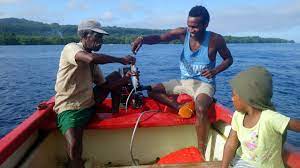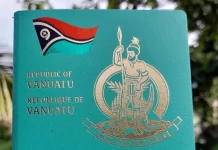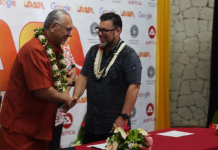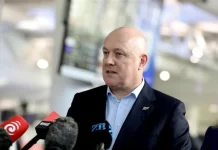A Vanuatu government envoy was at a fishing summit in Ecuador this year when he claims to have had a surprising encounter: two men linked with an obscure Panamanian company who said they represented his country.
Saade Makhlouf’s alleged discovery in February, on the sidelines of a gathering of an agency that oversees south Pacific fishing, spurred a surreal anti-corruption probe that had landed in London’s High Court.
The investigation led to allegations by Vanuatu that the Panama company, which is linked to Greek shipping magnates, had acquired the islands’ mackerel fishing rights “in perpetuity” for a fraction of their market value.
Vanuatu, a tiny nation of Pacific islands, is now locked in a legal battle over mackerel fishing rights that it claims were corruptly awarded to the Panama company, allegedly without the knowledge of the fishing ministry.
The islands’ Prime Minister Ishmael Kalsakau, elected in November, is now attempting to throw off the 2010 deal with Unimed Glory SA.
High Court papers obtained by the Financial Times indicated that Unimed was liable to pay only US$2 per tonne under the arrangement. Vanuatu said it had sought to sell the rights this year at US$300 per tonne.
The dispute has provided a glimpse into the lucrative and murky business of fishing in the south Pacific, which have historically been among the most abundant, and heavily overfished, waters in the world.
“We will not rest until all fishing quotas and financial resources taken through corrupt practices are paid back to the people of Vanuatu,” the government said through its London lawyers.
Lawyers for Unimed declined to comment on the dispute. In the High Court, Unimed has denied what it calls “vague smears about corruption” and said Vanuatu was seeking to breach its contractual rights.
Panama-registered Unimed has been previously linked in press reports to Laskaridis Shipping, owned by one of the richest shipping families in Greece. Unimed shares directors with a Panamanian company called Laskaridis Shipping Company Inc, according to Panama records. Laskaridis representatives did not immediately respond to a request for comment.
The litigation playing out in London’s High Court began last month when Unimed obtained an injunction blocking Vanuatu, a nation with an output of just US$1bn, from selling the rights to fish 15,000 tonnes of mackerel.
Unimed has relied on a 2010 agreement struck with a Vanuatu company whose director is a prominent local politician, according to court papers. The Vanuatu company had a contract to act as a government agent, but Vanuatu claimed the contract did not allow it to agree the Unimed deal.
The terms were amended in 2012 to compel arbitration and bar Vanuatu from using the defence of sovereign immunity in any dispute.
“In essence, the agreement provides Unimed with sole and exclusive access to Vanuatu’s fishing quotas which it has the sole right to sell on and trade,” Unimed said in court papers. The company said Vanuatu’s attempts to sell the fishing rights directly would “destroy Unimed’s business and reputation”.
Vanuatu alleged that the deal was “likely the result of corrupt practices”. It claimed the terms of contract “operate in perpetuity” and required Unimed to pay only a “very modest” fixed fee.
Notes of the March injunction hearing referenced in Vanuatu’s court submissions showed Unimed’s lawyer said the company “has been able to sell the quotas at much more than US$2 per tonnes”, adding: “There is a large margin…and I don’t shrink away from it. This is a highly lucrative contract for my client.”
Fishing in the south Pacific has since 2012 been overseen by an intergovernmental agency called the South Pacific Regional Fisheries Management Organisation (SPRFMO). Its members included Australia, China, the EU, Russia and the U.S.
Vanuatu claimed that in February, Makhlouf, a representative of the new government, attended a meeting of the SPRFMO and discovered two individuals associated with Unimed purporting to represent Vanuatu’s interests.
In court submissions, Vanuatu alleged it had been “kept in the dark for many years about the SPRFMO and has had almost no visibility about the use and transfer of its mackerel quotas”.
The country has claimed that it has no official records of the deal with Unimed, and that none of the payments due under the agreement has been received by Vanuatu.
Unimed argued in its court submissions that the government had not backed up its allegations of fraud and corruption, and that there were no proceedings against it in respect of those claims.
The company added all payments due under the agreement had been paid, and that there was “copious correspondence” between Vanuatu and Unimed “over a number of years”. Unimed also noted the 2020 SPRFMO meeting was held in Vanuatu itself.
“The claim that [Vanuatu] knew nothing about the agreement and the addendum and their fishing quotas is a nonsense,” Unimed said in the court papers. A court hearing in the dispute is expected in June.
SOURCE: THE FINANCIAL TIMES/PACNEWS














